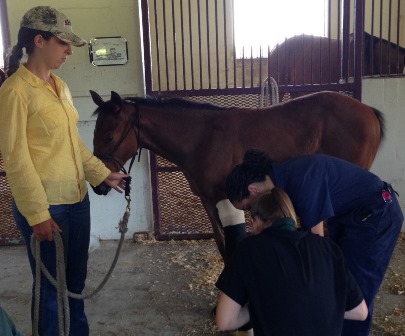Equine program benefits veterinary, undergraduate students

Recent UF graduate Katie Sheppard, far left, with UF veterinary students Vicky Liberman and Stephanie Spencer and Dr. Audrey Kelleman at the Equine Sciences Center in Ocala. At right is ESC staffer Chris MacDonald. Sheppard completed her undergraduate degree in animal sciences and will enter UF’s veterinary college’s D.V.M. program this fall. (Photo by Ashley Parsley, a UF summer volunteer and prospective veterinary student)
By Sarah Carey
Summer is in the air and foals are on the ground at the University of Florida College of Veterinary Medicine and in Ocala horse country. Helping to care for these foals are faculty, staff and students from the college, as well as animal-science students from the UF Institute of Food and Agricultural Sciences.
IFAS operates two equine centers, the Equine Sciences Center in Ocala and the Horse Teaching Unit in Gainesville. The facilities serve literally as training grounds for veterinary students, who visit as part of their theriogenology, or veterinary reproduction, rotation, and for undergraduate students who train to enter the equine or agricultural industry when they finish school.
“The students who go with me to Ocala work mostly on the breeding management of mares and with the foals,” said Audrey Kelleman, D.V.M., a lecturer in the college’s department of large animal clinical sciences and a specialist in equine reproduction.
“Under my guidance and that of the farm managers, the students get a lot of practical experiences that are excellent for building their clinical skills,” she said.
The ESC was established in 1969 and serves primarily as a nutrition and reproductive research facility. The center consists of 320 acres, mostly under pasture, but also houses a laboratory complex, barns, paddocks, and residences for staff and students.
“Both the ESC and the HTU employ and house student workers ,” said Joel McQuagge, faculty supervisor for both facilities.
“These coveted positions provide added value to the degree program through daily exposure to horses and agriculture,” he said.
One of Kelleman’s former students, Kayla Kurtz, D.V.M., of the Class of 2013, lived and worked at the ESC for six years, starting with her undergraduate program at UF and continuing through most of her veterinary studies.

Animal sciences student Katie Sheppard holds a foal while UF veterinary students Stephanie Spencer and Vicky Liberman examine the animal. (Photo by Ashley Parsley, a UF summer volunteer and prospective veterinary student)
“As a student resident, I was responsible for the feeding, monitoring and completing medical treatments of the broodmares, foals and stallions at the facility. This program played an immense role in shaping my current career path, and I feel especially privileged to have had the opportunity to work at the ESC,” Kurtz said. “I realized I was especially passionate about working with mares and foals. It helped build my confidence in working with them, and my understanding how to do so in a safe and efficient manner,” she said.
Quarter horse foals are born at the ESC in Ocala and as yearlings move to the Horse Teaching Unit, a 65-acre farm located about three miles south of the UF campus.
“There’s a horse psychology and training class, a form and function class, anatomy and physiology and more available to undergraduate students,” Kelleman said.
Operations at the unit are specifically aimed at helping students gain additional skills in the areas of breeding, training, marketing, farm management and healthcare. The site is operated by staff associated with IFAS and also serves as a location for IFAS Extension functions, including horsemanship clinics and judging contests.
“Eventually, the quarter horses are sold as 2-year-olds under saddle during the annual Performance Horse Sale,” said Kelleman.
The successful collaboration between IFAS and the UF veterinary college in the area of equine-related teaching dates back many years.
“To me it’s a neat thing that it’s been going on for so long. I went to the ESC with UF faculty members both when I was a student and as a reproduction resident in the 1990s,” Kelleman said. “It’s remarkable how much access the students get to horses and the horses get to the students.”










